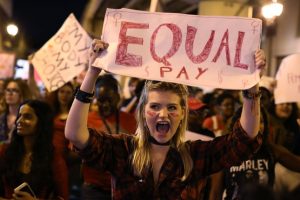 On Jan. 1, 2018, Iceland became the first country to make it illegal to pay men more than women. Iceland is home to 323,000 people and the country’s booming economy relies heavily on fishing and tourism. The new law covers roughly 150,000 workers in the country and applies to 1,200 companies in Iceland that have more than 25 employees. The measure is part of Iceland’s effort to eliminate the gender pay gap by 2022. Companies that fail to show pay parity will be faced with stiff fines.
On Jan. 1, 2018, Iceland became the first country to make it illegal to pay men more than women. Iceland is home to 323,000 people and the country’s booming economy relies heavily on fishing and tourism. The new law covers roughly 150,000 workers in the country and applies to 1,200 companies in Iceland that have more than 25 employees. The measure is part of Iceland’s effort to eliminate the gender pay gap by 2022. Companies that fail to show pay parity will be faced with stiff fines.
According to government figures from 2015, women earned on average 14 to 20 percent less than men. The New York Times cited a survey conducted by Market and Media Research in which 42 percent of executives and senior officials oppose the law, while just 21 percent of Icelanders are against it.
The World Economic Forum has ranked Iceland as the world’s most gender-equal country for the past nine years. The report uses markers like economic opportunity, political empowerment and health and survival in order to assess the state of gender equality in a country. The 2017 report listed Iceland at number one, followed by Norway, Finland, Rwanda and Sweden. The United Kingdom ranked at number 15, while the United States came in at number 49.
A 2015 study from McKinsey and Company reports that if women worldwide were paid the same as men, as much as $28 trillion, or 26 percent, could be added to the global annual GDP by 2025.
The gender pay gap is part of a larger, systemic issue of inequality, and each generation is going to (hopefully) keep working toward change and equality for future generations of girls everywhere.
-Sage Daugherty
Associate Editor
Girl Museum Inc.
